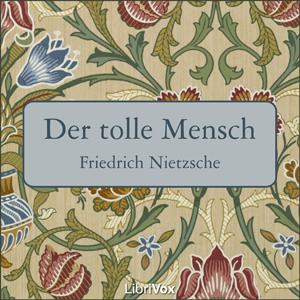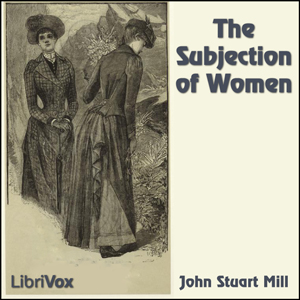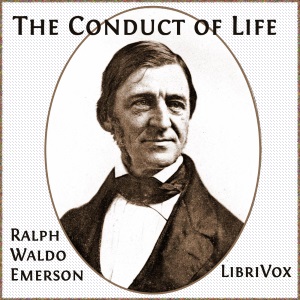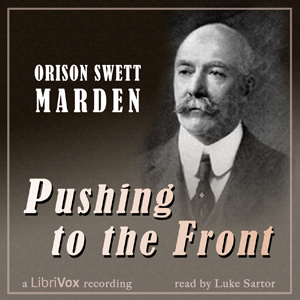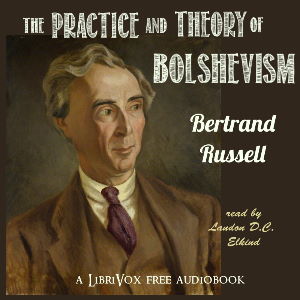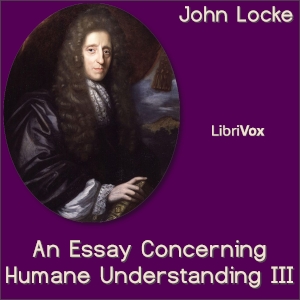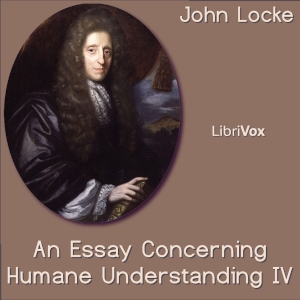“Der tolle Mensch” ist der Aphorismus 125 aus dem dritten Buch der “Fröhlichen Wissenschaft” und befaßt sich mit dem Thema “Gott ist tot”. Der stilistisch dichte Aphorismus enthält Anspielungen an klassische Werke der Philosophie und Tragödie. Dieser Text lässt den Tod Gottes als bedrohliches Ereignis erscheinen. Dem Sprecher in diesem Text graut vor der Aussicht, dass die zivilisierte Welt ihr bisheriges geistiges Fundament weitgehend zerstört hat. Der unfassbare Vorgang des Todes Gottes würde gerade wegen der großen Dimension lange brauchen, um in seiner Tragweite erkannt zu werden. (Zusammenfassung von Wikipedia.de und Rainer)
1 episodes
The Subjection of Women is the title of an essay written by John Stuart Mill in 1869, possibly jointly with his wife Harriet Taylor Mill, stating an argument in favor of equality between the sexes. It offers both detailed argumentation and passionate eloquence in opposition to the social and legal inequalities commonly imposed upon women by a patriarchal culture. Just as in "On Liberty," Mill defends the emancipation of women on utilitarian grounds, convinced that the moral and intellectual advancement of women would result in greater happiness for everybody.
(Summary from Wikipedia)
10 episodes
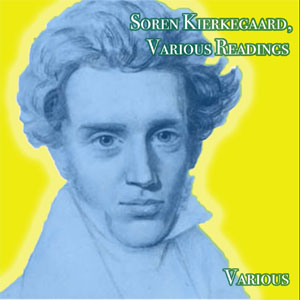
The writings listed here represent books about Soren Kierkegaard. A fragment of his work, On the Dedication to "That Single Individual", has made it to the public domain. Who was Soren Kierkegaard? He was a Danish philosopher and religious author; b. Copenhagen May 6, 1813; d. there Nov. 11, 1855. His father, Michael, a clothing merchant, once cursed God when he was young. This one incident caused him so much distress that it affected him with a deep melancholy, which he transferred to poor Soren. Michael was an evil man. He tricked Soren into thinking that the whole world existed in his own living room by taking him for imaginary walks about the neighborhood, or anywhere Soren wanted to go, as long as it existed in his imagination only. Later in life, when Soren was on his own, he rarely left Copenhagen, but he did walk about the streets and greet passersby, discussing events of the day. After 6 years of “splendid inactivity” he obtained his degree in Theology from the University of Copenhagen with the submission of his thesis paper in 1841, On the Concept of Irony with Continual Reference to Socrates. Just before graduation he fell in love with Regine Olsen and proposed that they marry. She accepted, but Soren was unable to live up to the requirements of marriage and broke off the engagement after a short period. He lived a life of despair afterward. His father, Regine, and Socrates were the major influences in his life. So say all the authors in the following readings, but I disagree.
Soren considered a variety of callings, he could be philosopher, a scientist, or a preacher, but he ultimately decided that Christianity was his interest. He wondered if J. P. Mynster, bishop of Zealand and head of the National Church of Denmark, was preaching true Christianity or not. He decided at this point that his “task is a Socratic task, to revise the conception of what it means to be a Christian”. He was interested only in the “How” of Christianity, not the “What” of Christianity. He became an author, an author who was always “in the process of becoming” what he would be. He became many authors, Victor Eremita, Johannes de Silentio, Johannes Climacus, Vigilius Haufniensis, Nicolaus Notabene, Hilarius Bookbinder, Frater Taciturnus, and Soren Kierkegaard. All of them wrote books between the years 1843 and 1855. He used his imagination to create each author as an existing individual Human being, one who exists, “between the esthetic and the ethical” where “the esthetic is existing; the ethicist is struggling against the religious”, as one “aware of the religious-and the leap” of faith, one “who ordinarily despairs of nothing, despairs of repetition”, one who has “used a love affair in relation to what it means to exist”, one who believed “that in relation to God we are always in the wrong,” one who cries to God “I cannot understand you, but I will love you” one who as "the ethicist, in despair, has chosen himself out of terror of having himself" and finally as one who said “that truth is objectively a paradox shows precisely that subjectivity is truth” so “Only truth that builds up is truth for you”.
The authors are all in agreement that Soren's father, Regine, and Socrates were influential in his life. None of them were able to state that Jesus Christ had any influence upon him at all. Soren Kierkegaard said, "God is not like a king in a predicament, who says to the highly trusted Minister of the Interior, “You must do everything, you must create the atmosphere for our proposal and win public opinion to our side.” "But in relation to God, there are no secret instruction for a human being any more than there are any backstairs. Even the most eminent genius who comes to give a report had best come in fear and trembling, for God is not hard pressed for geniuses. He can create a few legion of them if needed." God wants each individual to examine to judge and to decide. http://www.archive.org/details/forselfexaminati011847mbp
Here is a link to to some of his works http://www.religion-online.org/listbycategory.asp?Cat=110 one to a biography http://www.stolaf.edu/collections/kierkegaard/aboutkierk.html - and a link to Kierkegaard reorganized (systemetized?) - http://www.plough.com/ebooks/Provocations.html - (Summary by Soupy)
17 episodes
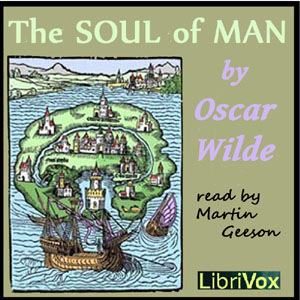
“(T)he past is what man should not have been. The present is what man ought not to be. The future is what artists are.”
Published originally as “The Soul of Man Under Socialism,” this is not so much a work of sober political analysis; rather it can be summed up as a rhapsodic manifesto on behalf of the Individual. Socialism having deployed technology to liberate the whole of humanity from soul-destroying labour, the State obligingly withers away to allow the free development of a joyful, anarchic hedonism...
“Is this Utopian? A map of the world that does not include Utopia is not worth even glancing at, for it leaves out the one country at which Humanity is always landing.”
Far from abandoning the epigram in favour of the slogan, Wilde wittily assails several of his favourite targets: the misguided purveyors of philanthropy; life-denying ascetics of various kinds; the army of the half-educated who constitute themselves the enemies of Art - and those venal popular journalists who cater to them...
“Behind the barricade there may be much that is noble and heroic. But what is there behind the leading-article but prejudice, stupidity, cant, and twaddle?” (Introduction by Martin Geeson)
6 episodes
G.K. Chesterton and James Walsh join Hilaire Belloc in an energetic rollout of the means by which history becomes propaganda, to the damage, not only to truth, but to the human soul. (Summary by Jan Baker)
4 episodes
This is the best of Emerson's later works, qualifying his earlier popular essays, series one and two, with the heavier hand of experience. The Conduct of Life ostensibly is a set of essays about how to live life, but also is an amalgam of what life taught Emerson. (Summary by Daniel Christopher June)
9 episodes
Gurudev Rabindranath Tagore talks of the many things he feels is necessary for creativity through joy of unity, he covers many topics like the creative ideal, makes comparisons of creativity between the east and the west, the spirit of freedom and about his idea of an University. (Summary by sidhu177)
11 episodes
A neat work on philosophy of mind by the 20th century analytic philosopher Bertrand Russell. (Summary by sidhu177)
18 episodes
Published in 1894, this is the first book by the renowned inspirational author, Dr. Orison Swett Marden. Pushing to the Front is the product of many years of hard work, and marks a turning point in the life of Dr. Marden. He rewrote it following an accidental fire that brought the five-thousand-plus page manuscript to flames. It went on to become the most popular personal-development book of its time, and is a timeless classic in its genre. Filled with stories of success, triumph and the surmounting of difficulties, it is especially well-targeted at the adolescent or young adult. It is a book to inspire the reader towards a noble sense of integrity, a strong moral foundation, and solid, enduring self-discipline to let the reader put each foot forward as the leader they are meant to be. (Summary by Luke Sartor)
67 episodes
Robert G. Ingersoll was an extremely popular humanist orator in the late nineteenth century, and he wrote Mistakes of Moses after many bootlegged versions of his speeches had been published and circulated. In Mistakes of Moses, through a close, literal reading of the Pentateuch, he challenges biblical stories using science, logic and morality. (Summary by Margaret)
13 episodes

The burgeoning conflict between science and organized religion in the Nineteenth Century had many cultural offshoots, one of the most significant of which was the New Thought movement. New Thought exponents sought to reconcile the principles of science and general spirituality in a synthetic practical philosophy which explored the universality of the human experience. The literature which developed as a consequence has provided the basic material used by most of today's self-help practitioners, and has won enduring popularity because of the simplicity of its concepts and the practical methods it espouses.
Among the earliest and most celebrated of these authors was James Allen (1864 - 1912). A reclusive man, he spent the last ten years of his life in rural seclusion in the village of Ilfracombe in Devon, during which period he wrote most of his twenty books. The most famous of these is As A Man Thinketh, a short treatise of the power of thought. This short work is one of the first great classics of self-help literature, and has never been out of print since it was first published in 1902.
Allen's main thesis is that thought is not just a vehicle for comprehending and explaining the world, but is also the prime mechanism for creating and changing human experience. While Allen's views may remain controversial, a vast audience of readers has found his work greatly inspiring.
(Algy Pug)
8 episodes

The Discovery of the Future is a 1902 philosophical lecture by H. G. Wells that argues for the knowability of the future. It was originally delivered to the Royal Institution on January 24, 1902. Wells begins by distinguishing between "two divergent types of mind," one that judges and attaches importance principally to what has happened in the past and one that judges and attaches importance principally to what will happen in the future. To the former he attributes the adjectives "legal or submissive," "passive," and "oriental," and to the latter the adjectives "legislative, creative, organizing, or masterful," and "active," calling it "a more modern and much less abundant type of mind."... Confessing himself to be among "those who believe entirely in the forces behind the individual" rather than in individuals themselves as determining causes, Wells argues that there is "no reason why we should not aspire to, and discover and use, safe and servicable, generalizations upon countless issues in the human destiny." Wells devotes the last part of his text to speculations about "the question what is to come after man," considering it "the most persistently fascinating and the most insoluble question in the whole world." He concludes with a statement of personal faith "in the coherency and purpose in the world and in the greatness of human destiny."
( Wikipedia and david wales)
3 episodes
James Allen (1864 - 1912) was a philosopher and a pioneer of New Thought movement. His works have formed the basis of much of the curriculum used today by many motivational and self-help groups,
His first book, which published in 1901, was From Poverty to Power, subtitled The Realization of Prosperity and Peace. Allen described this book as "A Book for all those who are in search of better conditions, wider freedom, and increased usefulness."
The book consist of two separate volumes, The Path To Prosperity (sometimes rendered as The Path of Prosperity) and The Way of Peace. Each volume has later published as a book in its own right.
This recording is of the first volume, The Path To Prosperity.
- Summary by Algy Pug
7 episodes
This is the William Wallace translation of the first part of Hegel's Encyclopedia of the Philosophical Sciences on logic. This is an outline of Hegel's logical system that he would use and elaborate on during his lectures, it is a shorter version of his earlier publication The Science of Logic. The William Wallace translation is very influential and famous for its clarity, although he took some liberties and does not always stick closely to Hegel's original text. - Summary by Ryan Smallwood
19 episodes

The genius of May Sinclair lies in her brilliant bridging of the Victorian and the modern eras, in her determination never to become ossified in an outdated way of thought or of Art. Though a generation older than the famous literati of the postwar era, she clearly perceived what was worth saving of the old and what was worth embracing of the new. This is clear, of course, in her remarkable fiction, particularly in the astonishing “Life and Death of Harriet Frean,” “Mary Olivier,” and “Tree of Heaven,” in which she broke new ground in psychological and stream-of-consciousness fiction. It is also true, however, in her crystal-clear philosophical works, “In Defense of Idealism” and “The New Idealism.” Though philosophical Idealism had become passé to many in the new era of scientific and mathematical Realism, Sinclair saw an opportunity to transmute her beloved, hard-won philosophy into a new kind of Idealism, one which absorbed the valuable insights of realists such as Einstein, Samuel Alexander, Alfred North Whitehead, and Bertrand Russell rather than rejecting them, producing a keen-eyed new view of transcendence and mystical meaning in the Universe. ( Expatriate)
37 episodes

Immanuel Kant gave a series of lectures on anthropology 1772-1773, 1795-1796 at the University of Königsberg, which was founded in 1544. His lectures dealt with recognizing the internal and external in man, cognition, sensuousness, the five senses, as well as the soul and the mind. They were gathered together and published in 1798 and then published in English in The Journal of Speculative Philosophy in 1867, volumes 9-16. Therefore, several texts will be used for this book. I was able to find sections 1-37 and then section 43, and sections 47-57. It seems that sections 38-42, 44-46 are not available. This is book one of his longer works.
My favorite quotes
If someone has purposely caused a disaster, and it is questionable whether he is at all, or in what degree he is to be, blamed for it, and whether or not he was insane at the time of the commission of the deed, the court should not refer him to the medical facility – the court itself being incompetent to decide upon such a case – but to the philosophical faculty. On this ground the question whether the accused was in the possession of all the faculties of his understanding and judgment, is altogether of a psychological nature….
Helmont says, that, after having taken a certain dose of “napell” – a poisonous root, he felt as if he thought in his stomach. Many people have experimented with opium to such an extent that they finally felt their minds weaken when they neglected to use this stimulant of their brain.
(Summary by Craig Campbell)
Links to texts:
Sections 1-2
Sections 3-4
Sections 5-7
Section 8
Sections 9-10
Sections 11-13
Sections 14-15
Sections 16-19
Section 20
Sections 21-22
Sections 23-26
26 episodes
In this piece, Bertrand Russell offers an account of propositions. This essay has been widely regarded as a turning point in Russell's thought: fresh from his prison sentence, during which he read numerous works of psychology, he now rejects the existence of the unitary, lasting metaphysical subject and the act-object analysis of sensation. He here embraces the view advocated by American philosophers like William James, namely, neutral monism. This far-ranging essay includes a lengthy discussion of behaviorism and of the structure of facts, complete with an endorsement of negative facts and criticisms of attempts to avoid them. - Summary by Landon D. C. Elkind
2 episodes
This 1912 book remains among the most widely-used and well-written introductions to philosophy in English. It was aimed to be an accessible introduction to philosophy for the average shopkeeper in England in 1912. Despite its accessibility It has engaged scholarly philosophical commentators on a range of issues raised in the work. Above all it conveys in easy and witty manner the philosophical frame of mind to those that have never encountered it before. It was almost immediately, and remains today, a classic. This recording is dedicated to Jill Evans, Esq. (Landon D. C. Elkind)
15 episodes
"Human, all-too-Human, is the monument of a crisis. It is entitled: 'A book for free spirits,' and almost every line in it represents a victory—in its pages I freed myself from everything foreign to my real nature. Idealism is foreign to me: the title says, 'Where you see ideal things, I see things which are only—human alas! all-too-human!' I know man better—the term 'free spirit' must here be understood in no other sense than this: a freed man, who has once more taken possession of himself." (Nietzsche; Ecce Homo, p. 75.)
18 episodes
This book records Bertrand Russell's impressions of the new regime after a 1920 visit to Russia following the 1917 Bolshevik Revolution, including his meetings with Lenin, Trostky, and Gorky. It includes a chapter that was authored by Dora Black, educational theorist and feminist author, and Russell's spouse. This chapter was unfortunately removed in the second edition, which was issued after Dora and Bertrand divorced. This recording is dedicated to my darling wife, Jill. Happy Hanukkah and Happy 2020! - Summary by Landon D. C. Elkind
17 episodes
This is the third book of John Locke's Essay on Human Understanding. Book I was Neither Principles Nor Ideas Are Innate. Book II was Of Ideas and Book III is Of Words. Locke is writing about the ideas we have in our minds and the things they are to represent. What does it mean to define a thing? What is an abstract idea? What is motion? What is essential to me as an individual? What would an Englishman born in Jamaica think about ice when he went to England for the first time? What is a concrete term? Locke tackles many such questions in this third book. Book IV is Of Knowledge and Probability. - Summary by Craig Campbell
15 episodes
This is the fourth book of John Locke's Essay Concerning Human Understanding. His book deals with knowledge and probability. He asks how far knowledge can go, if there are universal propositions, what are judgment and probability and deals with faith, reason and enthusiasm. - Summary by Soupy
23 episodes
A Concise, Reasoned, and Popular Exposition of Catholic Morals. The ten commandments, vice and virtue from the Catholic perspective.
The contents of this volume appeared originally in The Catholic Transcript, of Hartford, Connecticut, in weekly installments, from February, 1901, to February, 1903.
99 episodes

John Dewey, an early 20th Century American philosopher, psychologist, educational theorist. This project encompasses Part 4 of 4 of his book Human Nature and Conduct, An Introduction to Social Psychology, published in 1922. Dewey's uses the words "HABIT" and "Impulse" as a specialized catch-all words to describe how a person and his/her objective environment interact. This interaction is the basis for moral and ethical judgments. Dewey writes: "All habits are demands for certain kinds of activity; and they constitute the self.” In other places he also asserts that "Habits are Will." In the third part of the book, Dewey describes how we make ethical judgments (Dramatic Rehearsal) on the occasions which call upon the exercise of intelligence, and the relationship among aims, goals, means and ends, and emotions.
In this fourth section he ties together the preceding concepts and conclusions
Part 4: Conclusion
Section I: The Good of Activity
Better and worse; morality a process; evolution and progress; optimism; Epicureanism; making others happy.
Section II: Morals are Human
Humane morals; natural law and morals; place of science.
Section III: What is Freedom?
Elements in freedom; capacity in action; novel possibilities; force of desire.
Section IV: Morality is Social
Conscience and responsibility; social pressure and opportunity; exaggeration of blame; importance of social psychology; category of right; the community of religious symbol.
Soloist supplementary note: Very important but sometimes overlooked is his concept in Part 3 of the book of "Dramatic Rehearsal" which to me means: when we are deliberating over a course of action, we don't just tote up an arithmetic series of "if I do THIS, then THIS will happen, and then THIS will happen, etc. and weigh out the pluses and minuses" as a Utilitarian would do. No, what we do, says Dewey, is that at every step of divining what the future will hold, we examine how we FEEL about the situation. For example, if we're planning a chess move, we don't think to ourselves merely "if I make THIS move, I'll weaken my king side, but I'll gain a pawn" No, instead we think "if I make THIS move, I'll weaken my king side {Dang it all to hecky darn! }, but I'll gain a pawn {Yaaaay! hoorah! }". The force of our subjective and emotive intensity sway the final decisions.
~ Summary by William Allan Jones, Soloist
4 episodes
Six out of seven essays appearing here were reprinted from other publications; indeed, this 1910 collection went out of print, so that two of the essays occurring here were reprinted in Russell's 1917 "Mysticism and Logic, and Other Essays". Nonetheless, this essay records Russell's thinking at a critical juncture, just before the publication of Volume I of the co-authored "Principia Mathematica" and just after the passing of the American pragmatist, William James. These essays record Russell's reactions to pragmatism and its theory of truth, as well as the ethical aspects of philosophy suitable for co-existing alongside the new logical method in philosophy, announced subsequently in the 1914 "Our Knowledge of the External World: as a Field for Scientific Method in Philosophy". - Summary by Landon D. C. Elkind
10 episodes
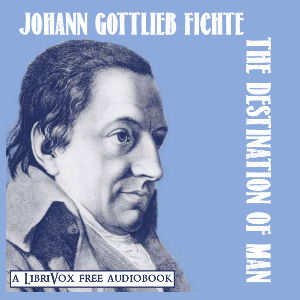
Johanne Fichte published The Destination of Man (Die Bestimmung des Menschen) in 1799. It was translated into English in 1846 by Jane Sinnett and then again in 1848 by William Smith. Fichte says his book is designed to "raise [the reader] from the sensuous world, to that which is above sense." Francis Bacon said, in The Advancement of Learning, "the two ways of contemplation are not unlike the two ways of action commonly spoken of by the ancients; the one plain and smooth in the beginning, and in the end impassable; the other rough and troublesome in the entrance, but after a while fair and even. So it is in contemplation; if a man will begin with certainties, he shall end in doubts; but if he will be content to begin with doubts, he shall end in certainties." Rene Descartes said "in order to seek truth, it is necessary once in the course of our life, to doubt, as far as possible, of all things." Fichte moves from doubt to knowledge and finally to faith in his exploration of the self. (Summary by Craig Campbell)
19 episodes
This work is a look at the life and ideas of Thomas Hobbes, English philosopher of the seventeenth century. The most important ideas are found in his famous work Leviathan. Taylor looks at such concepts of Hobbes as the contract, naturalism, sovereignty, natural laws, church and state, absolutism, and political obligation, etc.
9 episodes
An essay in three parts written in July 1840. "Human life is his topic, and he views it with an Oriental scope of thought, in which distinctions of Time and Space are lost in the wide prospect of Eternity and Immortality." (from the Introductory Note by F. B. Sanborn) - Summary by Fritz
4 episodes
